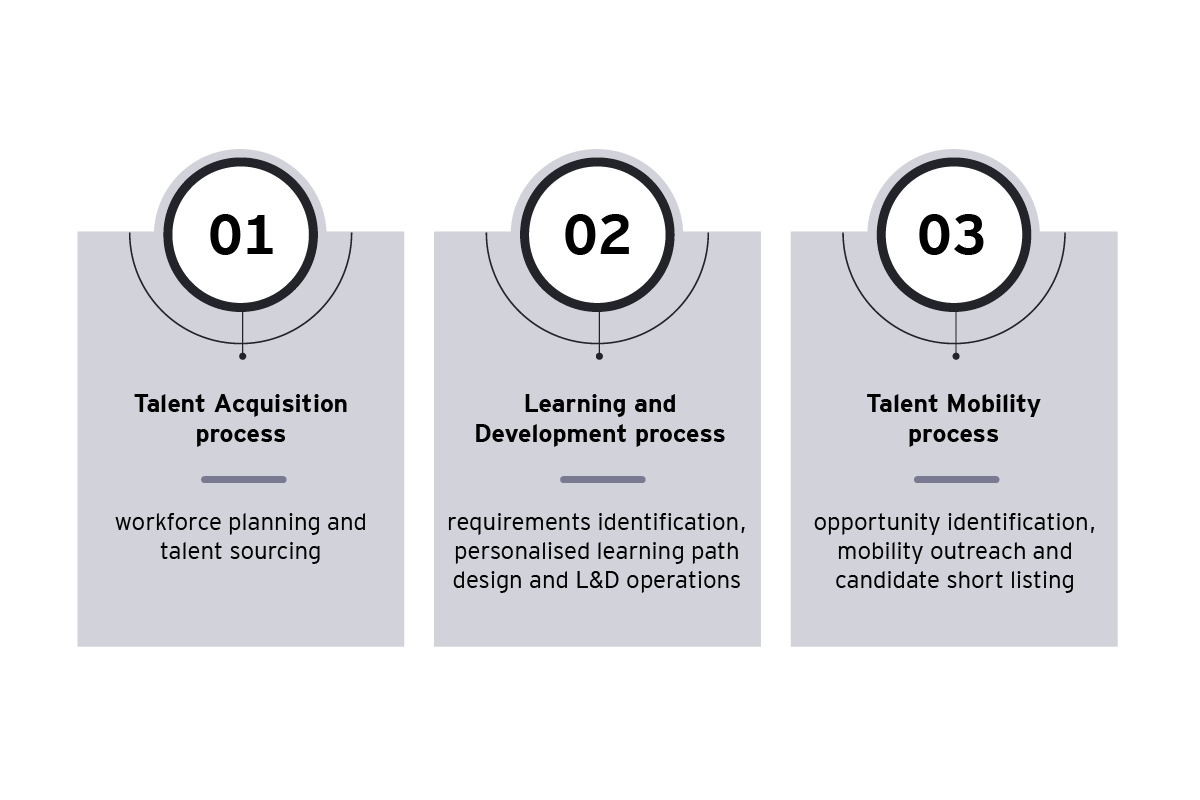EY refers to the global organization, and may refer to one or more, of the member firms of Ernst & Young Global Limited, each of which is a separate legal entity. Ernst & Young Global Limited, a UK company limited by guarantee, does not provide services to clients.

The skills-first transformation journey is like an ongoing marathon, where its early adopters have completed only a fraction of the race.
In brief
- Firms involved in skills-first transformation are enhancing diverse HR skills, placing emphasis on skills intelligence.
- A significant 83% of employees express confidence in remaining with organizations adopting a skills-first approach.
In the dynamic landscape of today's workforce, the surge in demand for technology and artificial intelligence skills, coupled with evolving employee expectations, has propelled the emergence of skills-first transformation (SFT) as a vital organizational imperative. Serving as the cornerstone for proactively identifying and nurturing 'power-user' talent, SFT integrates skills taxonomy, intelligence, and inventory data throughout business operations and the employee lifecycle.
The previous EY and iMocha report, ‘Tech skills transformation: navigating the future of work by 2025 and beyond’ focused on how tech skills are set to evolve in the coming years across all job roles, including traditionally non-tech roles. Building upon the same, their latest report, ‘skills-first transformation: a new approach to unlocking talent’, explores the intricacies of skills-first transformation, providing a roadmap for companies to navigate the evolving terrain and embrace SFT as a catalyst for organizational growth and success.
Surveying 560 global HR heads, regional HR heads and Country HR heads across APAC, EMEA, India and the US, the report uncovers a comprehensive perspective on the 'when and how' of SFT. By investigating the experiences of early adopters and emphasizing the role of skills intelligence in streamlining adoption roadmaps (SFT 2.0), it aims to guide companies at different stages-whether advanced, just starting, or yet to explore SFT.
Unveiling the SFT landscape
The first insight drawn from the survey reveals that more than half of global companies surveyed are focusing on skills-first transformation (SFT) as a business priority. 83% of the employees believe that they will stay longer with firms with a skills-first approach. Among industry sectors, telecom, technology products, and IT lead in adoption, with the United States taking the forefront among geographic regions.
The focal point: skills intelligence
Companies engaged in SFT are developing multiple HR capabilities, with skills intelligence emerging as the focal point. Notably, 'building future skills' stands shoulder to shoulder with retention as a business priority for Transformation Leaders—companies that have successfully implemented SFT. 1.5-2x of SFT-focused HR leaders prioritise building future skills, establishing skills-first career paths and improving talent mobility as compared to business as usual (BAU) HR leaders. HR leaders across APAC and EMEA prioritize ‘building future skills’ and ‘improving talent mobility’, on par with foundational objectives – ‘improving recruitment pipeline’ and ‘reducing attrition’.
Value realization from SFT capabilities
The third insight underscores the positive impact of SFT on key HR metrics. The value realization from SFT by early adopters is intrinsically linked with their prioritization of SFT on par with core HR objectives and capabilities. Transformation Leaders report significant improvements in retention and employee performance. Moreover, these companies have experienced approximately twice the revenue growth over the past three years compared to their counterparts who are yet to explore SFT. Majority of Transformation Leaders have reported a positive impact on talent retention and development (63%), and improvement in employee performance (58%) due to adoption of SFT initiatives.
Challenges in the journey ahead
While SFT presents a promising path forward, challenges are inevitable. Lack of skills intelligence tools is perhaps a prominent hurdle in accurately capturing skills data. Additionally, a frequent obstacle is the lack of leadership support. Early adopters, who initiated their SFT journey with skills inventory and assessments, can mitigate several challenges by incorporating skills intelligence seamlessly across business processes.
The need to build technical skills of the future results in differentiated prerogatives at each level. Skill intelligence has emerged as the catalyst for SFT 2.0, offering a potential solution to the key challenges faced by early adopters of SFT 1.0. This includes the absence of tools to capture precise skills data, difficulties in integrating skills-based data into HR systems, and the lack of a skills taxonomy to identify relevant skills for specific roles.

In the future, skills intelligence platforms are poised to extend their impact beyond skills-first transformation (SFT). Serving as the singular repository for skills data throughout the organization, these platforms not only establish a crucial foundation for implementing AI across various functions and processes but also facilitate the comprehensive development of 'deep skills' and the scalable cultivation of 'power user' talent.
Request access to the "Skills-First Transformation" Report
Want to read the full report? Sign up for access.
Summary
Skills intelligence holds the promise of effectively simplifying the SFT process, allowing newcomers to surpass those who adopted early and quickly realize the benefits of SFT. In the next decade, as skills intelligence becomes as widespread as ERP and CRM, companies currently emphasizing SFT can anticipate using it as a competitive edge.
Related articles
ESG excellence: Unlocking potential through GCCs
With ESG becoming strategic business priority, GCCs in India must seize this moment and proactively develop ESG capabilities to drive the global ESG agenda.
Seamless onboarding: a step-by-step guide to employee background checks
Step-By-Step Guide to Employee Background Checks at EY ensures thorough employment background verification process, and fraud prevention for hiring.
How can GCCs enable organizations to be more customer-centric?
EY highlights how GCCs continue to flex their capabilities, which they must leverage as a key pivot in building organizational customer centricity.
How EY can help
-
Strategic HR Transformation team at EY specializes in HR management, consulting & strategy—evolving HR into a human value activator that drives innovation.
Read more -
EY Spotmentor uses AI to identify and close workforce skill gaps—empowering organizations to build a future-ready team with enhanced learning insights.
Read more -
AI in Recruitment: EY TalentMiner, AI recruiting tool helping organizations reduce time to hire, improve candidate experience & enhance quality of hire.
Read more






